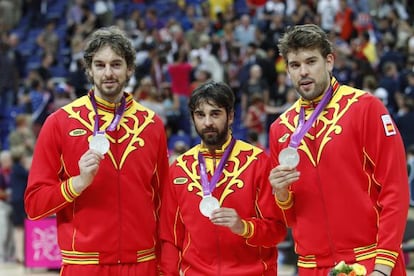Spain’s silver Olympics dominated by unsung female athletes
Basketball team pushes USA close in final after patchy London Games performance

The Spanish men’s team won a silver medal on the final day of the London Olympics at the end of basketball tournament that was as bittersweet for the nation’s athletes as the Games as a whole. Having overcome inconsistencies in their performances to reach the final, Spain played up to its potential against USA before losing 107-100 in a repeat result of the Beijing 2008 final.
But other frontline teams were way off the mark in London. Spain’s soccer team, for many a favorite to at least reach the final at Wembley, limped out after a group phase in which it failed to score a goal in three matches. After the withdrawal due to injury of Rafael Nadal, none of Spain’s men or women could pick up a medal at the tennis event, and the men’s handball and water polo teams were both knocked out at the quarterfinal stage of their competitions.
Consolation came, however, in the performances — often quite unexpected — of Spain’s women Olympians. Both the water polo and handball teams won medals, while sports as diverse as wrestling, windsurfing, whitewater canoeing, sailing and taekwondo all saw Spanish women athletes take the podium.
In the end, Spain won 17 medals in London, just one down on the 18 garnered in Beijing four years ago. The preponderance of silver (10) as opposed to gold (three) meant that Spain finished some way further down the overall medal table, in 21st compared to its 14th position from 2008.
Saúl Craviotto, who on Saturday won silver in the kayak 200-meter sprint, was due to bear the Spanish flag at the closing ceremony, the Catalan having won gold at the Beijing Games.
New final, same result
In a rematch of the 2008 final in Beijing, Spain’s male basketball side once again had to settle for silver after a hard-fought game in London was won by USA 107-100. The Americans led from the start, but were chased hard by Spain, which produced its best basketball of the Games, bringing the teams level at 68-68 in the third quarter.
Seven-footers Pau and Marc Gasol and Oklahoma center Serge Ibaka gave USA trouble under the basket, while Navarro’s outside shooting opened up room for the big men. However, Spain played half of the second quarter and all of the third without Marc Gasol who picked up his fourth foul in the second quarter. Spain coach Sergio Scariolo inexplicably left him in the game when he collected his third foul early on.
As the two sides entered the final quarter USA was leading 83-82, but for almost the first time Spain could not keep up in the scoring. Kevin Durant hit a three-pointer to give USA a 93-86 lead. Spain pulled back within six points after Juan Carlos Navarro and Rudy Fernández scored four points without reply and in the final five minutes it looked as though Spain might be able to turn the game around, until LeBron James came back into the game off the bench with 3:20 remaining. After a no-nonsense dunk, he then then hit a three-pointer with just inside of two minutes left to put USA up 102-93.
The Spanish men’s basketball team has largely failed to live up to expectations in London. Defeat at the hands of Russia led to accusations that they lost their subsequent preliminary-phase game to Brazil in order to position themselves for a final, rather than a semifinal, against USA.
There have been injuries: Marc Gasol has been troubled by shoulder and knee problems; Rudy Fernández had back surgery in March; Ricky Rubio was out after knee surgery; and Serge Ibaka was buried at the end of the playing rotation.
Spain seemed more of a threat in 2008, when it lost the Olympic final to USA by 118-107 after pulling within four points in the final three minutes.
Pau Gasol and Navarro, the team captain, are both 32, and they have been playing for Spain since they were juniors in their teens. Navarro struggled after he sustained another foot injury near the end of Spain’s tournament-opening win over China on August 5. “It has been a very complicated road, and we’ve had a lot of hurdles this time,” said Pau Gasol. “In 2008 our team was probably better in terms of physical condition, and our road was slightly easier to the final. Our level of play was probably a little higher than it is right now. We have had to overcome a lot of adversity. There is a lot of merit in what we've achieved.”
Tu suscripción se está usando en otro dispositivo
¿Quieres añadir otro usuario a tu suscripción?
Si continúas leyendo en este dispositivo, no se podrá leer en el otro.
FlechaTu suscripción se está usando en otro dispositivo y solo puedes acceder a EL PAÍS desde un dispositivo a la vez.
Si quieres compartir tu cuenta, cambia tu suscripción a la modalidad Premium, así podrás añadir otro usuario. Cada uno accederá con su propia cuenta de email, lo que os permitirá personalizar vuestra experiencia en EL PAÍS.
¿Tienes una suscripción de empresa? Accede aquí para contratar más cuentas.
En el caso de no saber quién está usando tu cuenta, te recomendamos cambiar tu contraseña aquí.
Si decides continuar compartiendo tu cuenta, este mensaje se mostrará en tu dispositivo y en el de la otra persona que está usando tu cuenta de forma indefinida, afectando a tu experiencia de lectura. Puedes consultar aquí los términos y condiciones de la suscripción digital.








































